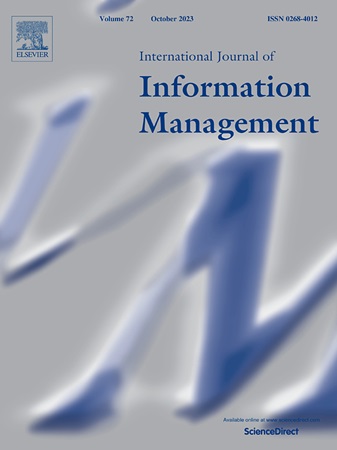人工智能驱动的CRM能力模型:推进营销的双重性、盈利能力和竞争绩效
IF 27
1区 管理学
Q1 INFORMATION SCIENCE & LIBRARY SCIENCE
International Journal of Information Management
Pub Date : 2025-10-01
DOI:10.1016/j.ijinfomgt.2025.102981
引用次数: 0
摘要
人工智能(AI)驱动的客户关系管理(CRM)系统的迅速采用暴露了一个关键的差距:尽管投入了大量资金,但许多组织未能从这些技术中获得有意义的商业价值。最近的调查显示,虽然人工智能是高管们的战略重点,但只有一小部分表示获得了可观的回报,在面向客户的职能部门,采用人工智能面临的挑战尤其严峻。本研究通过概念化和实证研究人工智能驱动的CRM作为一种高阶组织能力来解决这一差距。借鉴动态能力理论的微观基础,采用三阶段研究设计。首先,系统的范围审查和与行业专家的深入访谈确定了人工智能驱动的CRM能力的核心维度和子维度。其次,我们在一个逻辑网络中操作和验证这些维度。第三,一项针对澳大利亚205名银行员工的调查测试了人工智能驱动的CRM能力对营销双重性的影响,进而对组织成果的影响。定量分析证实,人工智能驱动的CRM能力积极塑造了营销的双重性,从而提高了盈利能力和竞争优势。从理论上讲,这些发现通过引入集成了数据管理、多渠道集成和服务产品的微基础能力模型,推进了CRM研究。实际上,该研究为寻求缩小“价值实现差距”的管理人员提供了可操作的指导,通过培养人工智能驱动的CRM系统作为动态能力,在动荡的市场中平衡探索和开发。本文章由计算机程序翻译,如有差异,请以英文原文为准。
AI-powered CRM capability model: Advancing marketing ambidexterity, profitability and competitive performance
The rapid adoption of Artificial Intelligence (AI)–powered Customer Relationship Management (CRM) systems has exposed a critical gap: despite substantial investment, many organisations fail to derive meaningful business value from these technologies. Recent surveys show that while AI is a strategic priority for executives, only a fraction report significant returns, with adoption challenges particularly acute in customer-facing functions. This study addresses this gap by conceptualising and empirically examining AI-powered CRM as a higher-order organisational capability. Drawing on the microfoundations of dynamic capability theory, we adopt a three-stage research design. First, a systematic scoping review and in-depth interviews with industry experts identify the core dimensions and subdimensions of AI-powered CRM capability. Second, we operationalise and validate these dimensions within a nomological network. Third, a survey of 205 banking employees in Australia tests the influence of AI-powered CRM capability on marketing ambidexterity and, in turn, on organisational outcomes. The quantitative analysis confirms that AI-powered CRM capabilities positively shape marketing ambidexterity, which subsequently enhances profitability and competitive advantage. Theoretically, the findings advance CRM research by introducing a microfoundational capability model that integrates data management, multi-channel integration, and service offerings. Practically, the study provides actionable guidance for managers seeking to close the “value realisation gap” by cultivating AI-powered CRM systems as dynamic capabilities that balance exploration and exploitation in volatile markets.
求助全文
通过发布文献求助,成功后即可免费获取论文全文。
去求助
来源期刊

International Journal of Information Management
INFORMATION SCIENCE & LIBRARY SCIENCE-
CiteScore
53.10
自引率
6.20%
发文量
111
审稿时长
24 days
期刊介绍:
The International Journal of Information Management (IJIM) is a distinguished, international, and peer-reviewed journal dedicated to providing its readers with top-notch analysis and discussions within the evolving field of information management. Key features of the journal include:
Comprehensive Coverage:
IJIM keeps readers informed with major papers, reports, and reviews.
Topical Relevance:
The journal remains current and relevant through Viewpoint articles and regular features like Research Notes, Case Studies, and a Reviews section, ensuring readers are updated on contemporary issues.
Focus on Quality:
IJIM prioritizes high-quality papers that address contemporary issues in information management.
 求助内容:
求助内容: 应助结果提醒方式:
应助结果提醒方式:


